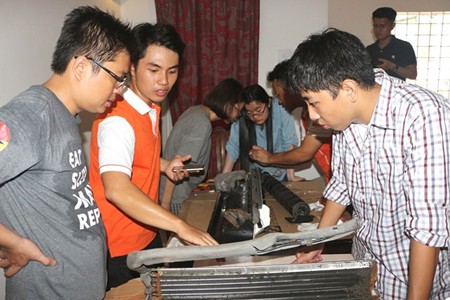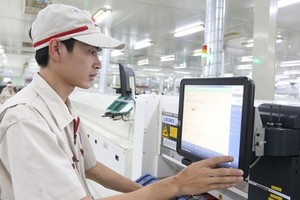
This 4-day conference, co-hosted by FabLab Saigon, Saigon Innovation Hub (SIHUB), and the network of Vietnamese FabLabs, has connected many professionals from Japan, Taiwan (of China), Korea, Jordan, India, and the Philippines with Vietnamese inventors and innovators in order to foster useful social projects for local communities.
In particular, within the framework of the conference, experts will give technical and professional advice to sustainable projects of many Vietnamese individuals as well as organizations. These include bicycle-powered water purifying equipment, solar-powered public lighting system for rural areas, lepironia articulata straw making to limit waste from plastic straw of Mr. Tran Minh Tien.
The projects are eligible for the 17 criteria of sustainable development of the United Nations and all have their finished model. Yet due to the lack of proper technology and investment source, they cannot be manufacture in a large scale.
In the conference, it is hoped that technical solutions will be introduced to help apply these useful sustainable projects nationwide. The conference is also supposed to foster creativity among young inventor communities in Vietnam.
According to Ms. Tran Thi Thu Huong, Director General and Assistant to the Minister of Science and Technology as well as Program Director of the Vietnam – Finland Innovation Partnership Program second phase (IPP2), the task of raising awareness on sustainable development matters such as water treatment, affordable and clean energy, and environmental protection is one of the community activities that need to be encouraged and popularized.
FabLab, otherwise known as fabrication laboratory, is an educational and creative space for the community. The first FabLab was founded in 2009 in the laboratory of MIT’s Center Bits and Atoms in the USA. At the moment, there are around 1,200 FabLabs globally.
The network of FabLabs provides equipment and knowledge for education and innovation via the use of state-of-the-art technologies as well as manufacturing solutions taking advantage of digital devices.
These are supposed to help inventors in many aspects.
Through these methods, FabLabs contribute to the improvement of the living standards, economy, culture, and environment in the world.
FabLab Saigon is the first one to be established in Vietnam, which paved the way to for six more centers like that later. FabLab Saigon focuses on the training of creative thinking and innovative methods in turning inventions into real products.
























